“Once they enter the workplace, the British are among the worst idlers in the world,” A quote from Britannia Unchained by Liz Truss, Dominic Raab and Kwasi Kwarteng. It’s the kind of lazy comment you might hear down the pub, but given the UK’s poor economic productivity is it valid to question a nation’s approach to work? Shadow Home Secretary Chris Philp certainly thinks so saying he worked hard all his life, and why can’t the rest of Britain just be a bit more like him? And if we look at global attitudes to work, the UK does stand out, the UK is the least likely to say work is important in their life, just 73%. On the question of whether work should come first, the UK is third from the bottom with just 22% agreeing with that statement. Going back to Britannia Unchanged the authors continue “Whereas Indian children aspire to be doctors or businessmen, the British are more interested in football and pop music.” But, valuing things in life other than work, doesn’t make you lazy, arguably it just makes your life more balanced.
Firstly, in terms of hours worked, it is not true to say the UK works fewer hours.
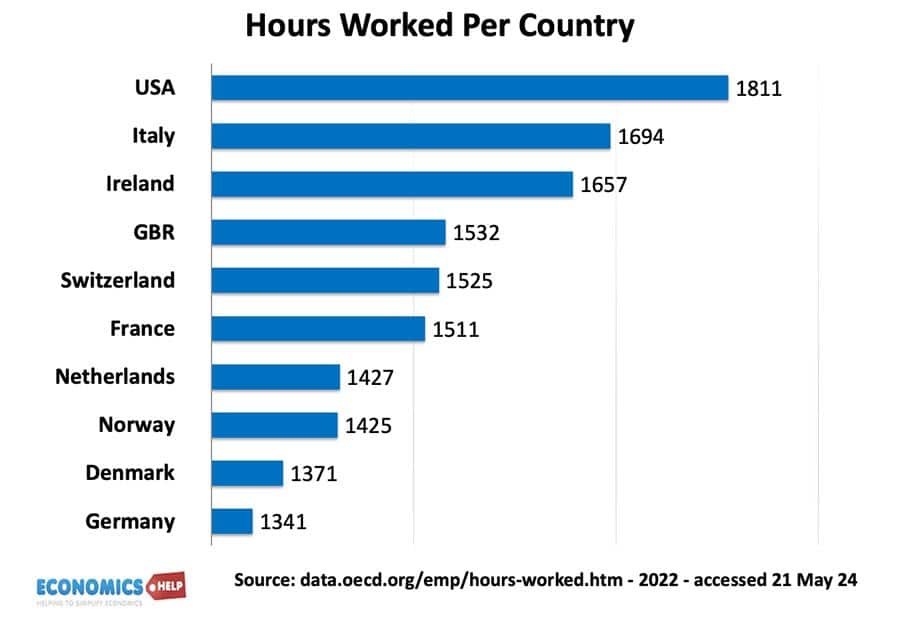
We work more hours than France, Denmark and Germany, all countries with higher living standards and higher productivity. In fact, productivity in France is 17% higher than UK, despite French attitudes to work being very different. The French are more likely to go on strike, they retire four years early, they have longer holidays, enjoy long social work lunches, which stands in contrast to a British worker more likely to eat a sandwich at the desk. The French have strong labour market protections, which in theory, increase costs for firms and make it hard to hire and fire. Yet, French productivity is higher than the UK. This is a reminder that working long hours isn’t necessarily linked to productivity. But, happy workers can be productive workers. Another difference between France and the UK is that more French degrees are related to business, which gives more work-related skills, UK degrees are more intellectual arts-based, which are less tied to what businesses need.
Japan
Another comparison which springs to mind is Japanese companies, where workers would come in early and sing the company song before working a 14 hour day. Certainly in Japan’s heyday of the 1980s – when they had growth rates of 5% plus, we admired from a distant Japan’s worker loyalty and motivation. It seemed to be on different level to British work culture. But, the shine has definitely gone out of the Japanese model, with long-employment contracts becoming something of a trap. Japanese productivity is the worst in the G7.
Inactivity
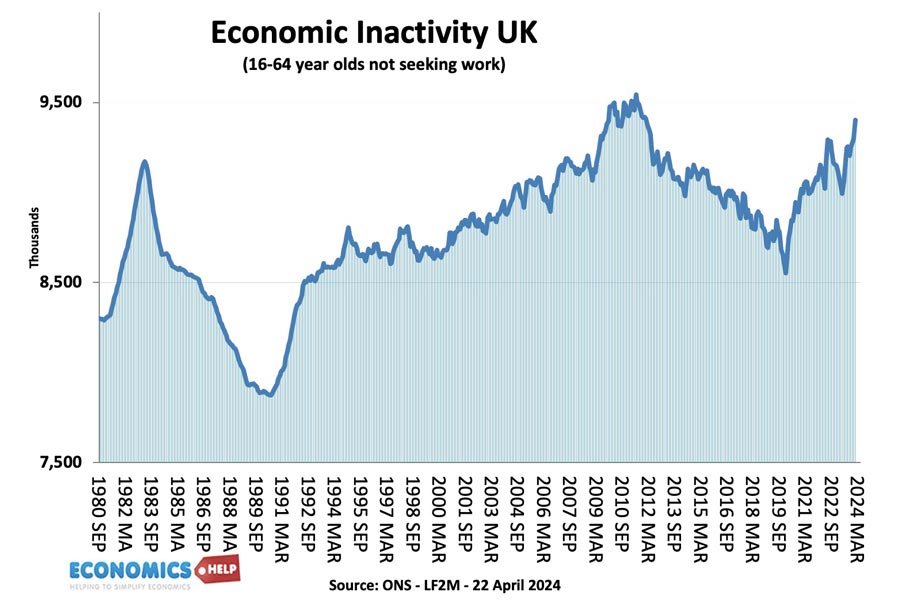
In the UK one trend that is concerning is that inactivity rates seem to be rising, this means people neither working or looking for work. According to the ONS, inactivity rates have risen to over 9 million, and this is especially a problem with young people. Rates of Young people not in education, employment or training has also increased in recent times. In total the UK has 11 million adults who are not working. This inactivity is due to various different reasons – unemployment, education, sickness, looking after family and early retirement.
However, before we get carried away by a fear we are giving up on work, the Resolution Foundation claim that ONS stats are actually unreliable and they are overstating inactivity rates. The ONS state inactivity is 37%, the resolution Foundation claim it could be just 36%, closer to long-term trends. Ironically, ONS data is becoming unreliable, because people are unwilling, perhaps you could even say too lazy, to fill in the labour force survey. Just 17% responded last year, a record low. Covid, working from home all means that the ONS is working with incomplete data.
Long-Term Sickness
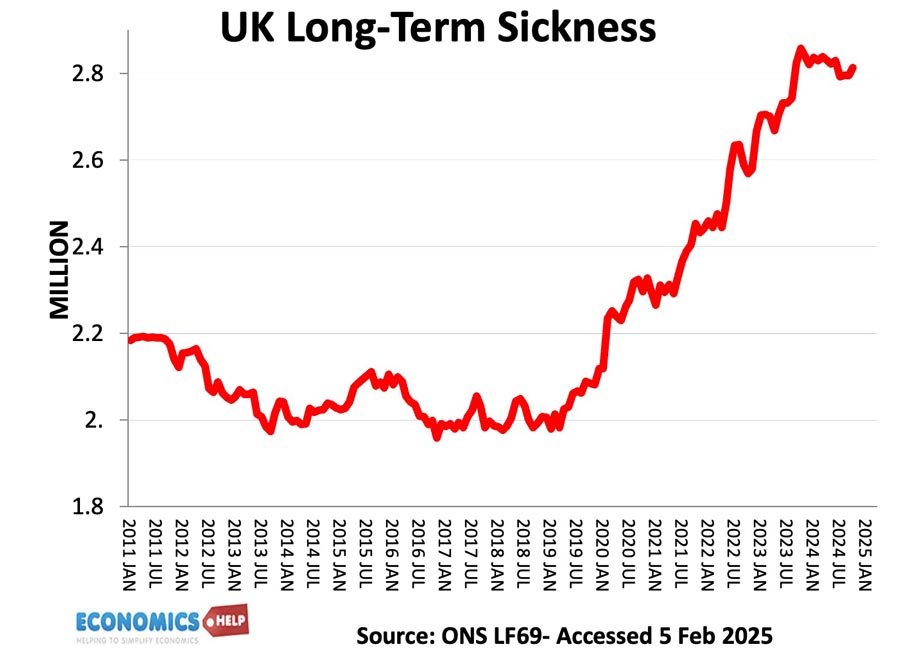
But, what is uncontested is that there has been a significant rise in long-term sickness, and this is a cause for concern. Why are more young people signing off sick, is it because of an increase in genuine health problems, a shift in attitudes or a response to changes in the benefits system, which has created more of an incentive to become diagnosed as sick, rather than unemployed? Since 2019, there has been a 55% increase in sickness absence rates. The pandemic not only exacerbated many health conditions but perhaps encouraged people to have different attitudes. However, the average number of days lost due to sickness is still only 7.8 days per year and it is worth bearing in mind, that UK sick pay is amongst the lowest in Europe and offers little financial support. It’s no free meal, phoning in sick
Younger People’s Attitudes
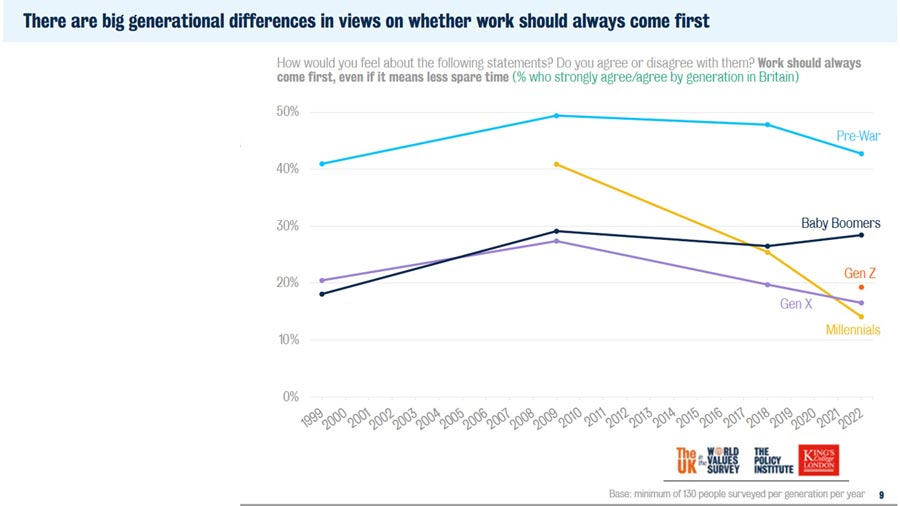
Is it true the younger generation have different attitudes to work? On the question of whether it is good to place less importance on work, 52% of Gen Z said it would be good, amongst the pre-war generation it was just 22%. At least some Gen Z influencers talk about quiet quitting, minimal effort, and acting their wage. However, a few loudmouths on social media is not conclusive. I asked subscribers whether they though work ethic was a reason for poor productivity in the UK, 48% disagreed strongly, but 35% agreed to some extent I agree it is hard to disentangle and low investment, technology are probably much bigger factors. But, one common view was that often there was often poor incentive to work hard as it was not rewarded in their company. The best way to get better pay was not by working really hard, but moving to a new job. Certainly, the corporate culture of a business can make a big difference. And also there can be a big difference between being self-employed and a small cog in a giant corporation.
Early Retirement
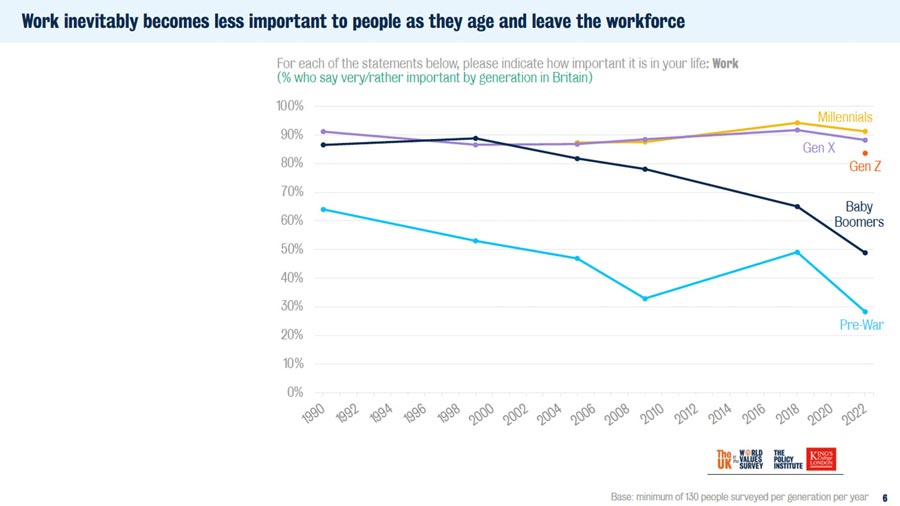
Also, going back to the different attitudes of young and old. One reason for growing inactivity is actually early retirement. People in their 50s who own a house, and have paid off their mortgage are in a completely different financial situation to young people have to pay a high share of income on rent. On the question of how important is work in your life. For Gen X and Gen Z it is 89% and 82%. For baby boomers, it is just 49%. In other words, baby boomers have the financial luxury of placing less emphasis on work. For the younger generation, work is actually very important to meet the cost of living. The young generation face innumerable economic challenges. Student fees of up to £40,000, house prices 8* income and a difficult job market. Outside of London, the IFS note 42% of graduates are doing non-graduate jobs, so it is not surprising if young workers feel demotivated. They left university with big debts, but now struggle to gain a job equivalent to career. A recent report by KPMG said two-fifths (40%) of UK workers are considering a career change due to the rising cost of living, up from 35% in 2022.
Don’t See Lazy Workers
Are British workers lazy? As I was pondering this video, I spent the day observing people working. People collecting bins, delivery drivers, visiting a friend in hospital, baristas in the café. I didn’t see any laziness. If anything I observed many workplaces are understaffed. My favourite café usually has just two workers when they open, and they don’t really have time to pick up empties and clean the table. It’s pretty much nonstop, you have to work hard. The only time I really encountered lazy workers was when I was working at my old college with a self-proclaimed anarchist. He put in a lot of effort to avoid any constructive work, I found it really tiring, it’s much more satisfying to work properly and do a good job. Though he probably grew out of his anarchist phase and is earning £100k in the city of London now. I have a friend who manages a call centre in Bristol area. He says it’s a mixed bag, a really difficult job dealing with irate customers. Some work really hard, but he says there is a phenomenon of people working from home and calling in sick. They kind of bounce from job to job. They know it’s pretty hard to get fired so they can abuse the system, but it is small percentage.
If there is real laziness perhaps it is amongst the ultra wealthy who can live on their dividends and income. House of Lords attendence is not exactly out of this world.
Benefits?
What about the benefit system does it encourage people to not work? In 2024, there were 4 million on means tested benefits with no requirement to work, It is argued a crackdown on unemployment benefits has encouraged many to move into more expensive health-related benefits. Policy in Practice said previous reforms had created a “structural incentive” to claim incapacity benefits, with people on universal credit getting up to £4,320 a year more if they are long-term sick with no work requirements.
But, it’s not straight forward, The IFS found the benefits system has become more supportive of those moving into work. In 1997, low earners with children lost 50p for every £1 they gained moving into part time work. In 2023, that is just 38p for every pound. But, the IFS state there is a big disincentive going from part time to full time. In 1997–98 moving to full time implied losing 52% to taxes or withdrawing benefits. Today it implies losing 58%.
Does worker effort and work ethic affect productivity? Yes, I do believe it does. But, it’s not easy to measure and a lot of this comes down to corporate culture, worker attitude and it is something that cannot easily be influenced by government policy. Also, I kind of like the fact the UK workers say there are more important things than work, sometimes economic growth and productivity are placed on a pedestal making us forget other things in life. This video looks at whether an obsession with economic growth is healthy.
Related
Related

Yes. The average (native) British worker from a usually non ethnic background is by far the lowest achieving, lowest productive group. This has been demonstrated in educational attainment over the past decade. With incentives to avoid work, attempts to medicalise and attach a diagnosis to normal variations in health, the epidemic of mental health issues (some real and a large number perceived) and lack of ability to cope with the basics of life, the anti-aspirational nature of this incompetent administration has destroyed any hope of economic recovery and a hopeful future. The U.K. is becoming the cesspit of Europe and soon to be the world